PLATO’S THEORY OF LANGUAGE: THE ISOMORPHISM OF KOSMOS AND LOGOS IN THE TIMAEUS
PLATO’S THEORY OF LANGUAGE: THE ISOMORPHISM OF KOSMOS AND LOGOS IN THE TIMAEUS
Author(s): Alexey PleshkovSubject(s): Metaphysics, Ancient Philosphy, Philosophy of Language
Published by: Vilniaus Universiteto Leidykla
Keywords: Plato; the Timaeus; theory of language; metaphysics; language naturalism; language conventionalism;
Summary/Abstract: The paper considers Plato’s theory of language through the prism of the Timaeus’ metaphysics. It is argued that the apparent contradictions of Plato’s philosophy of language are the consequence of the two-fold nature of language, and that the metaphysical scheme proposed by Plato in the Timaeus can shed a light on his coherent theory of language. The linguo-metaphysical isomorphism of the Timaeus presupposes that (1) words and material elements have their own meaning and nature respectively; (2) they can be reduced to an infinite variety of amorphic sounds and receptacle; (3) the participation in truth is possible only at the level of narrative and universe. According to this scheme the universe (κόσμος), as well as any speech (λόγος), can be explained by the reduction to its constituent elements, but it will be only necessary explanation. Whereas for Plato, the true understanding of cosmos and logos is possible only on the level of the coherent unity of the whole, which represents the ideal paradigm in the best possible way.
Journal: Problemos
- Issue Year: 2017
- Issue No: 91
- Page Range: 128-140
- Page Count: 13
- Language: English

